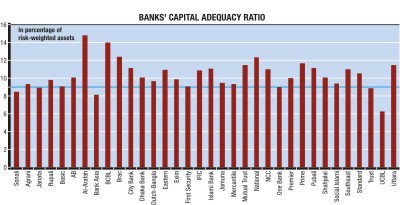Most of the forty-seven commercial and specialised banks have dodged various risks to successfully maintain their capital adequacy.
However, according to Bangladesh Bank (BB) information, five banks — two private commercial banks and three specialised banks — failed to meet the capital demand.
The central bank set a mandatory timeframe for the banks to maintain their capitals against 8 percent of the risk weighted assets by June 2010 and 9 percent by June 2011.
According to BB statistics, on December 31, 2010 two specialised banks and one private commercial bank had their capital in the negative, and one specialised and one private commercial bank’s capital was below the required 8 percent.
A BB official said the two specialised banks give most of their loans to agriculture sector as per a government  directive. As a result, these banks cannot maintain their financial health up to the standard.
directive. As a result, these banks cannot maintain their financial health up to the standard.
Of the two private commercial banks, one has long been a problem bank and it was closed once. After resuming its operation under new ownership it is yet to restore its health.
Capital adequacy focuses on the total position of the banks’ capital and protects the depositors from potential shocks of losses that a bank might incur, said the central bank official.
He said it helps absorb major financial risks such as credit risk, market risk, foreign exchange risk and interest risk.
According to central bank statistics, most of the private commercial banks could maintain capital above 9 percent. Some banks maintained capital up to 11 percent to 14 percent, and only four will have to take their capital adequacy to 9 percent by June. Of these four banks, two could not meet the 8 percent target.
The four state-owned commercial banks succeeded in maintaining 8 percent capital but two of them are still having deficit in maintaining 9 percent capital by June.
Till December, the total risk weighted assets were Tk 4,08,134 crore against which the banks maintained a capital of Tk 35,803 crore, and the overall deficit was Tk 1,006 crore.
The BB officials said the overall deficit occurred as some banks had negative capital. However, the private commercial banks had a capital surplus of Tk 3,070 crore.
They expressed satisfaction over the overall capital situation of the banks. An International Monetary Fund (IMF) mission recently suggested more cautious monitoring of the banks’ capital situation.
The IMF said, further progress in financial sector reforms is essential to ensure overall stability and reduce fiscal risk. It said the BB needs to enforce a sound regulatory and supervisory framework over the commercial banks.
The IMF especially stressed better financial health of the state banks. It also said the capital adequacy indicator for the state banks is not in line with the Basel-II standards and thus provides a false impression about the financial health of these banks.
The BB officials said the government is going to augment the capital of the state banks soon.
They said the commercial banks’ exposure to the capital market has increased in the recent times. Although the banks had to run their business amid various risks, they could maintain the capital at a satisfactory level, the officials said.
The BB is continuing its monitoring drive so that all banks can maintain required capital by June this year, they added.
Courtesy of The Daily Star




















